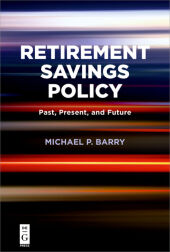 Neuerscheinungen 2018Stand: 2020-02-01 |
Schnellsuche
ISBN/Stichwort/Autor
|
Herderstraße 10
10625 Berlin
Tel.: 030 315 714 16
Fax 030 315 714 14
info@buchspektrum.de |

Retirement Savings Policy
Past, Present, and Future Tense
2018. XXV, 248 S. 15 b/w ill., 10 b/w tbl. 230 mm
Verlag/Jahr: DE GRUYTER; DE G PRESS 2018
ISBN: 1-547-41645-9 (1547416459)
Neue ISBN: 978-1-547-41645-5 (9781547416455)
Preis und Lieferzeit: Bitte klicken
Mike brings to this work his comprehensive experience and consummate technical talent in a beautifully readable book. A treasure. --Frank Cummings, Former Adjunct Lecturer in Law at UVA Law School, Columbia Law School, NYU Law School, and ALI-ABA Retirement Savings Policy reviews the basic policies that govern retirement savings plans, and their real world application, focusing on the key issues of finance, taxation, fiduciary conduct, and employee choice. The discussion is framed around the three fundamental challenges confronting employers and employees today - the pension legacy, the 401(k) revolution, and the pressure, from policymakers, regulators, opinion leaders, and individuals, for changes that will put retirement security within reach of all Americans. With more than 40 years´ experience in the field, Michael P. Barry provides both a wealth of practical detail - best practices and concrete solutions - and a broad framework for understanding the issues surrounding retirement plans and strategies. The result is a comprehensive introduction to the forces that drive sponsor, participant, and policymaker decision-making. This is the perfect book for benefits and financial professionals who want a better understanding of the basic rules that govern retirement plan administration but also serves those interested in truly understanding the nuances and issues surrounding retirement plans and policies. The approach is practical, focusing on how US retirement plans actually work, how they are taxed (and not taxed), how they are regulated. But it is also conceptual, devoting considerable attention to an understanding of why these plans work the way they do. Why regulators and policymakers are so focused on a handful of issues - expanding coverage, reducing fees, fairness. And, at the highest level, what are the problems that we are trying to solve. As such, much of what we discuss will be of interest to a more general reader, who wants a realistic understanding of what is really at stake in current retirement policy debates.
Don´t be intimidated by its ambitious title, Retirement Savings Policy: Past, Present and Future guides its readers deftly through a history of the U.S retirement system to answer the questions-how did we get here, and how do we move forward? Those who know Mike Barry from his Plansponsor column will recognize that he is a writer gifted in parsing out complex and thorny retirement policy issues, zeroing in on their implications, and offering unique perspectives on how to tackle them. He does not disappoint here, neatly intertwining the tough policy challenges facing the U.S. retirement system within a comprehensive and easy-to-digest primer on that same system. Anyone who wants to understand why 401(k) plans have evolved as they have, and what it might take to get the retirement system on track will want to read this book. The alarm bells that Barry raises about the possible future of not only the U.S. retirement system-but our economy as a whole-if care is not taken in shoring up the $11 trillion defined contribution system is in itself worth the price of admission, and an essential read for those seeking to figure out: what should we do to help future retirees?
-Lori Lucas, CFA, President and CEO, Employee Benefit Research Institute


